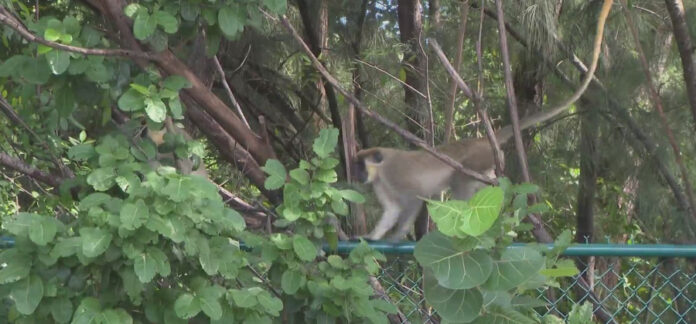by: Brian Entin and Nexstar Media Wire
Posted:
/ Updated:
FORT LAUDERDALE, Fla. (NewsNation Now) — They have been spotted in neighborhoods, on power poles, and even made it onto the tarmac at a busy South Florida airport.
Wild vervet monkeys are thriving in Fort Lauderdale, Florida.
A colony of several dozen monkeys lives near the Fort Lauderdale-Hollywood International Airport.
“When I first started this project it was like an urban legend. Trying to figure out exactly where the monkeys came from and where to find them,” said biologist Dr. Missy Williams.
Williams has been studying the monkeys for years and has a name for each monkey.
“I am out here everyday and I love it,” Williams said.
She says she traced the monkeys’ ancestors back to a roadside zoo called the Danie Beach Chimpanzee Farm.
About fifty monkeys escaped from the zoo.
The monkeys frequent area businesses where employees have gotten to know and feed them.
“They are pretty much always looking for food. Once they eat, they run,” said Dave Winquist, a parking lot employee.
Winquist works at a parking lot near the airport and interacts with them almost everyday.
“Bananas. Peanuts. They’ll even eat packets of grape jelly if they can get their hands on it,” Winquist said.
The monkeys live in four different colonies and they mostly stick together. However, Williams says once in a while, a male monkey will venture off in search of a mate. Some of the males have been spotted up to thirty miles away.
“They have navigated this really complex urban system without getting hit by cars and they make it back. So it is really phenomenal how they move through the city without getting detected and without getting hit by cars,” Williams said.
Williams says there have been no documented cases of aggression by the monkeys, and they don’t seem to bother anyone.
Sadly, she says, it is people who threaten them.
“I would say humans are their biggest predator, of course. People sometimes, because the exotic pet trade here in Florida is a big thing, people sometimes try to take them as pets,” said Williams.
Since Williams started studying the monkeys six years ago, she says five have disappeared. She later discovered some were trapped.
“Primates are not pets. They do not do well in captivity at all. They are best to be out free. They learn how to be monkeys from other monkeys and in captivity they become bored and have problems,” Williams said.
It is against the law to trap or hurt the monkeys, but beyond that, they don’t have protection under Florida law because they are classified as non native.
Williams is hoping to get special permission from the state to take the monkeys to the vet when they are sick or injured.
But for now, all she can do is observe the wild monkeys who have survived city life for nearly sixty years.














